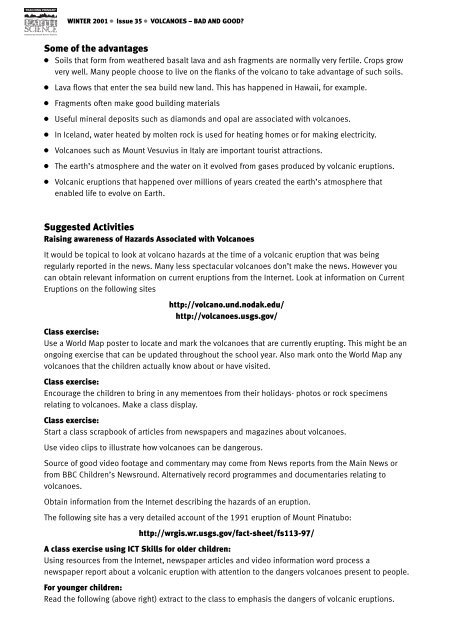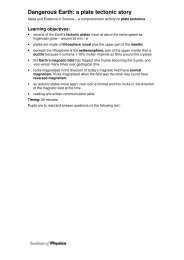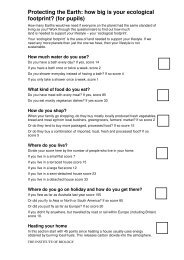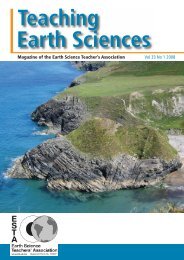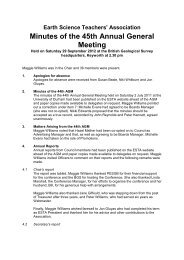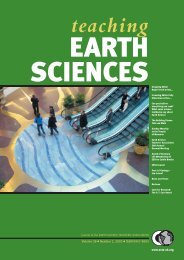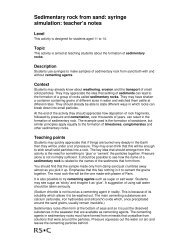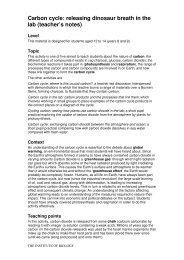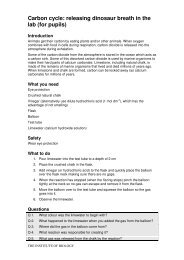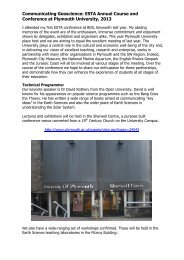teaching - Earth Science Teachers' Association
teaching - Earth Science Teachers' Association
teaching - Earth Science Teachers' Association
You also want an ePaper? Increase the reach of your titles
YUMPU automatically turns print PDFs into web optimized ePapers that Google loves.
WINTER 2001 ● Issue 35 ● VOLCANOES – BAD AND GOOD?<br />
Published by the <strong>Earth</strong> <strong>Science</strong> Teachers<br />
Some of the advantages<br />
● Soils that form from weathered basalt lava and ash fragments are normally very fertile. Crops grow<br />
very well. Many people choose to live on the flanks of the volcano to take advantage of such soils.<br />
● Lava flows that enter the sea build new land. This has happened in Hawaii, for example.<br />
● Fragments often make good building materials<br />
● Useful mineral deposits such as diamonds and opal are associated with volcanoes.<br />
● In Iceland, water heated by molten rock is used for heating homes or for making electricity.<br />
● Volcanoes such as Mount Vesuvius in Italy are important tourist attractions.<br />
● The earth’s atmosphere and the water on it evolved from gases produced by volcanic eruptions.<br />
● Volcanic eruptions that happened over millions of years created the earth’s atmosphere that<br />
enabled life to evolve on <strong>Earth</strong>.<br />
Suggested Activities<br />
Raising awareness of Hazards Associated with Volcanoes<br />
It would be topical to look at volcano hazards at the time of a volcanic eruption that was being<br />
regularly reported in the news. Many less spectacular volcanoes don’t make the news. However you<br />
can obtain relevant information on current eruptions from the Internet. Look at information on Current<br />
Eruptions on the following sites<br />
http://volcano.und.nodak.edu/<br />
http://volcanoes.usgs.gov/<br />
Class exercise:<br />
Use a World Map poster to locate and mark the volcanoes that are currently erupting. This might be an<br />
ongoing exercise that can be updated throughout the school year. Also mark onto the World Map any<br />
volcanoes that the children actually know about or have visited.<br />
Class exercise:<br />
Encourage the children to bring in any mementoes from their holidays- photos or rock specimens<br />
relating to volcanoes. Make a class display.<br />
Class exercise:<br />
Start a class scrapbook of articles from newspapers and magazines about volcanoes.<br />
Use video clips to illustrate how volcanoes can be dangerous.<br />
Source of good video footage and commentary may come from News reports from the Main News or<br />
from BBC Children’s Newsround. Alternatively record programmes and documentaries relating to<br />
volcanoes.<br />
Obtain information from the Internet describing the hazards of an eruption.<br />
The following site has a very detailed account of the 1991 eruption of Mount Pinatubo:<br />
http://wrgis.wr.usgs.gov/fact-sheet/fs113-97/<br />
A class exercise using ICT Skills for older children:<br />
Using resources from the Internet, newspaper articles and video information word process a<br />
newspaper report about a volcanic eruption with attention to the dangers volcanoes present to people.<br />
For younger children:<br />
Read the following (above right) extract to the class to emphasis the dangers of volcanic eruptions.


